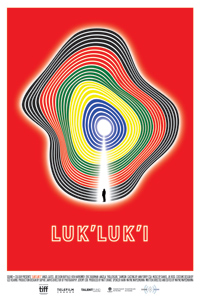Luk’Luk’I | 2017 Toronto International Film Festival Review
Understanding the Ignored: Wapeemukwa Misfires But Manages to Deeply Move
 The line between reality and fiction are difficult to separate in this Wayne Wapeemukwa’s feature debut, a borderline abstruse film that blends nonfiction individuals in a setting with a narrative reach exceeding its grasp. An expansion on his 2014 short Luk’Kuk’I: Mother, this extraordinarily unconventional work snatches at heartstrings with the deconstruction of the main cast’s desires, contesting how the world perceives them, all the while pointing up the contemporary state of urban colonialism in Canada. Though Luk’Luk’I is a compelling journey whose power resides in its cinéma vérité roots and technical achievements, the film falters at convincingly exploring its desired themes.
The line between reality and fiction are difficult to separate in this Wayne Wapeemukwa’s feature debut, a borderline abstruse film that blends nonfiction individuals in a setting with a narrative reach exceeding its grasp. An expansion on his 2014 short Luk’Kuk’I: Mother, this extraordinarily unconventional work snatches at heartstrings with the deconstruction of the main cast’s desires, contesting how the world perceives them, all the while pointing up the contemporary state of urban colonialism in Canada. Though Luk’Luk’I is a compelling journey whose power resides in its cinéma vérité roots and technical achievements, the film falters at convincingly exploring its desired themes.
On February 28th 2010, the gold medal hockey game between Canada and the USA rounds out that year’s olympic games in Vancouver. While complementarily re-creating real-life stories of five individuals within fictional scenarios in Vancouver’s Downtown Eastside, “Canada’s Poorest Postal Code” in the oft-described “World’s Most Liveable City” is made the spotlight for the resilience of its marginalized residents.
Each of these characters snake in and out of each other’s lives; sometimes knowingly with developed relationships, other times by proximity only, but each instance stitches the film’s focus on the community as a whole. A mother (Angel Gates) wanting to celebrate her child’s birthday, a father (Eric Buurman) attempting reconnection with his estranged son (Justin Drummond-Hay), a disabled man (Ken Harrower) trying to see the game, a skateboarding native (Joe Buffalo) seeking out family, and a rollerskating woman (Angela Dawson) utterly convinced of her self-declared celebrity set the stage for a exploration through the neighborhood in which they all live. While certain events, mainly involving a flying saucer and a mental music video interlude, are obviously out of reality, the majority of the film is played so naturalistic and honestly, that it is hard to determine the fictionalized elements.
Immediately notable is the choice of the 4:3 aspect ratio. Wapeemukwa and dp Jeremy Cox heighten the film’s visual style while affording much more direct focus to its subjects, removing gloss for hard-hitting colors and grain. Semblances of intrigue and tension are kept taut by Matt Drake’s sound design, evoking considerable instances of pain, alienation and determination as Cox’s camera refuses to visually divulge these moments so imaginations take the reins. Wapeemukwa’s editing gives the narrative an ever-constant lingering stress; an opening sequence reminiscent of Bernardo Bertolucci’s The Conformist, shots ambling along sluggishly to extort discomfort, a different editorial flare divvied out per protagonist, and the final scene is easily one of the more shocking movie endings in recent memory.
Though this is a culmination of effectively moving themes, real-life drama, and technical innovation, the majority of its duration with what appears to be a directionless template, the film wraps up tightly and succinctly, which exasperates the previous two acts’ interminable impression. Its declared theme dissecting contemporary colonialism in Canada’s underbelly may only be apparent to those already familiar with the subject matter and timeframe; for other than Wapeemukwa’s mission statement, there are no evident proclamations on these people other than their evident alienation in a society that refuses to understand them. Powerful, ambitious and with a desire to explore an under-told reality, Luk’Luk’I goes the distance, but it remains unclear whether it certifiably reaches its desired end goal.
Reviewed on September 14th at the 2017 Toronto International Film Festival – Discovery Programme. 90 Mins.
★★★/☆☆☆☆☆
Matthew Roe is a Baltimore-based film critic and award-winning filmmaker, who has contributed to over 100 various films, videos and web series, and is the founder of the independent production company Heaven’s Fire Films. He writes dedicated columns titled Psycho Pompous and Anarchic Cinema for CommunitySoul.net on film history and theory. Top Films From Contemporary Film Auteurs: Bekmambetov (Nochnoy dozor), Herzog (Fitzcarraldo), Miike (Audition), Haneke (Funny Games), Lynch (Mulholland Dr.), Johnson (Brick), Clark (Kids), Aronofsky (Requiem for a Dream), Tarantino (Inglorious Basterds), Anderson (There Will Be Blood), Coyula (Memorias del desarrollo).






















